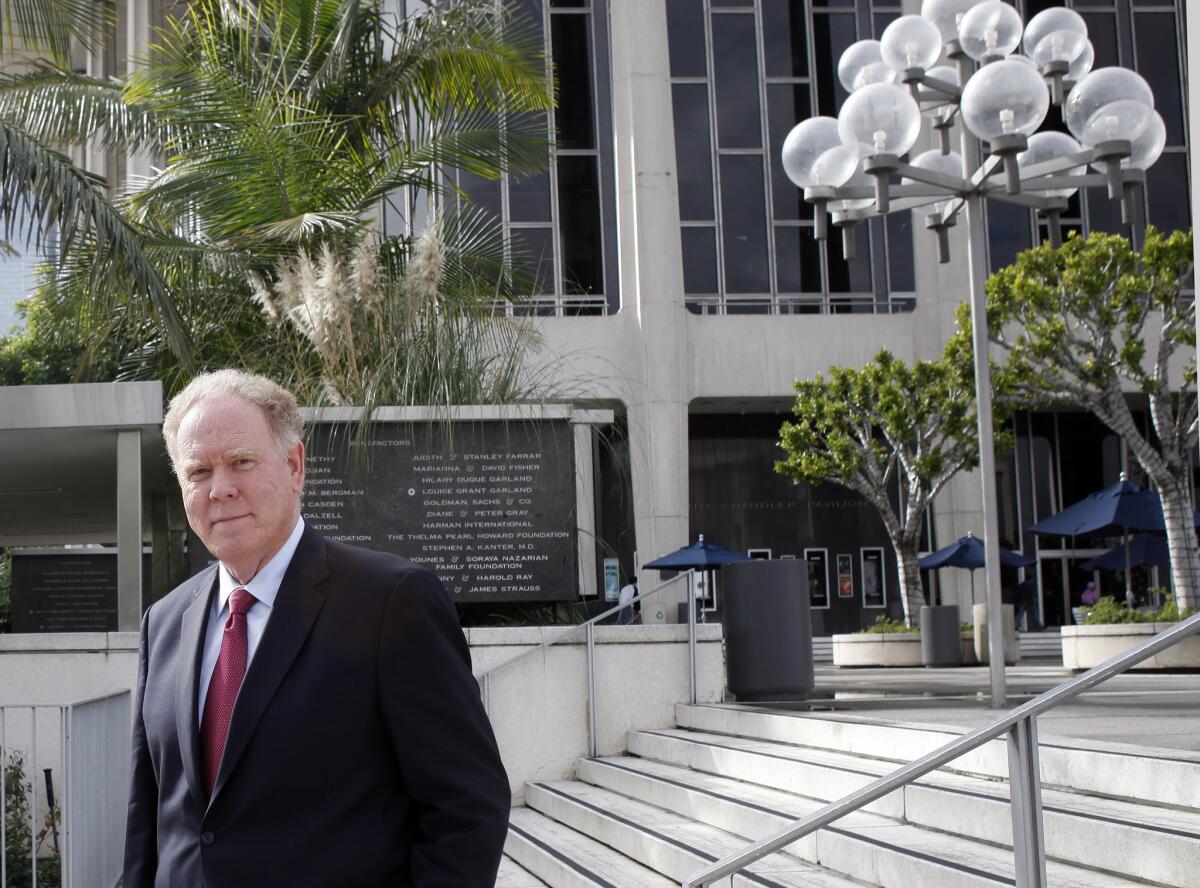Music Center’s Stephen Rountree plans exit, Center Theatre Group move

Stephen Rountree will step down after 12 years as president of the Music Center to take a more narrowly focused, less highly compensated job at one of its key tenants, Center Theatre Group, where he will head business operations as managing director.
The Music Center and CTG said that Rountree, 65, will make the switch in January, replacing Edward Rada at the theater company, while Howard Sherman, a veteran Music Center executive, steps in as interim president.
The two institutions say both Rada and Rountree initiated the moves. But they come as Center Theatre Group is trying to reverse a long streak of budget deficits that has reached six consecutive seasons since the 2008 recession, with red ink approaching $17 million over that span. “Theater has always been my first love in all the performing arts, and this was a chance to trade a very broad job for one that’s much deeper and closer to the making of the art,” he said. “I got excited and energized” when the chance came up.
The three theaters that make up Center Theatre Group — the Ahmanson, the Mark Taper Forum and the Kirk Douglas in Culver City — are by some measures the country’s busiest nonprofit theater company. The Music Center is primarily a landlord to CTG and three other resident companies.
Rountree, 65, and Michael Ritchie, Center Theatre Group’s artistic director, said that Rountree is not being brought aboard to repeat the role he played at Los Angeles Opera from 2008 to 2013, when he took charge of its business operations during a financial crisis while continuing to head the Music Center. Rountree helped stabilize the company by cutting its spending by about 30%, which allowed it to rebound and increase spending modestly in recent seasons.
“I don’t think this is anything like the opera in terms of the severity of the financial issues,” Rountree said of his new position at Center Theatre Group. “I think [CTG] needs some financial fine-tuning, but from everything I know I don’t think this is a major turnaround, or heavy restructuring or downsizing. It’s the opposite, to get their feet solidly under them to take advantage of the 50th anniversary [which is coming in 2017-18] and build and expand the company for the future.”
Ritchie said that the current 2014-15 season is off to a good start and has a chance to end the deficit streak — although he said the budget adopted by CTG’s board calls for yet another deficit, about $1.1 million.
The company has drawn on reserves built up before the recession to avoid drastic cuts in the number of productions on its three stages: the 739-seat Taper and 2,064-seat Ahmanson Theatre at the Music Center, and the 315-seat Kirk Douglas in Culver City.
Ritchie said the company still has a $25-million reserve fund it can tap if needed, but “it’s clear to all of us you can’t consistently run deficits.” He said he helped recruit Rountree over the summer, after Rada said he’d be leaving after about three years as managing director. Rada had worked as CTG’s chief financial officer or managing director for 15 of the past 18 years.
Ritchie and Rountree had talked, met and shared lunches regularly over the last decade, and when the CTG artistic director, who regarded Rountree as “a peer and a sounding board,” mentioned the impending search for a new top business executive, “the idea of him joining up came up.”
Rountree, who was an administrator for the J. Paul Getty Trust for 22 years before coming to the Music Center, said he had decided to step down as president in the coming year or so “because it was just time in my life to do something different.” The CTG opportunity struck him as just the kind of thing he’d like to try.
Rountree enjoys a fund of goodwill at Center Theatre Group for his role in engineering a $29.5 million Music Center bond issue to pay for a 2008 renovation of the Mark Taper Forum, said Jim Royce, the longtime former Center Theatre Group marketing director who left earlier this year. “It would not have happened without Stephen,” Royce said. “We were getting to the point that we weren’t going to raise the money in time for it to be done, and Stephen had the idea of issuing bonds.”
Rountree said he has a three-year contract and is taking a substantial pay cut from his Music Center earnings, which totaled $850,287 in pay and benefits during 2012. The general manager’s job at Center Theatre Group paid $378,693 in 2011, the most recent year immediately available, divided between Rada and his longtime predecessor, Charles Dillingham, who left midway through the fiscal year.
Ritchie was Rada and Dillingham’s boss, but he won’t be Rountree’s superior under a switch in CTG’s management structure that has both executives reporting directly to the theater company’s board. .
As artistic director, Ritchie will pick the plays, decide which new scripts to spend money on developing, and will have final say over who directs and designs the shows. On the business side, Rountree will provide advice on what the company can afford, and what the financial implications of the available possibilities might be. He’ll also be responsible for how the seasons are marketed once Ritchie makes his picks.
Ritchie said that Rountree’s portfolio will include helping to brainstorm ways of generating celebratory hoopla and fundraising successes in conjunction with the company’s 50th anniversary season that will begin in the fall of 2017.
However, the Music Center’s own 50th anniversary is passing without a public fundraising campaign, apart from a high-priced gala in December. And the Music Center’s fundraising muscle under Rountree came into question recently when it canceled an innovative classical music program in Grand Park, whose programming it oversees.
Sufficient donations had failed to materialize to present the U.S. premiere of “Universe of Sound: the Planets,” an interactive on-screen presentation in a large tent of Gustav Holst’s “The Planets,” performed by London’s Philharmonia Orchestra led by Esa-Pekka Salonen, the former L.A. Philharmonic music director.
The Music Center has averaged about $10 million in annual donations in recent years, while CTG has pulled in an average of $11 million to $12 million.
Rountree’s successor will face some heavy financial lifting to push forward with two projects that were long envisioned under Rountree but have failed to take shape — a makeover of the now 50-year-old Dorothy Chandler Pavilion, including expanding its backstage and upgrading acoustics and production technology, and redoing the large plaza between the Chandler Pavilion and the Mark Taper Forum.
Rountree estimates that the Chandler makeover will cost $350 million, and the plaza $25 million. The Music Center so far has been unable to persuade the Board of Supervisors to OK construction funding that Rountree said should be expected to cover the entire cost of the plaza and a large share of the Chandler renovation.
He chuckled when asked if he’s relieved not to have to keep pushing for political support, and then lead a large funding campaign for the Chandler.
“No, [ducking a big fundraising campaign] didn’t factor into my thinking at all,” Rountree said. “I’m excited about the [Chandler] project and would have been thrilled to start it five years ago if I could have.”
Staff writer David Ng contributed to this report.
Follow me on Twitter: @boehm
More to Read
The biggest entertainment stories
Get our big stories about Hollywood, film, television, music, arts, culture and more right in your inbox as soon as they publish.
You may occasionally receive promotional content from the Los Angeles Times.











